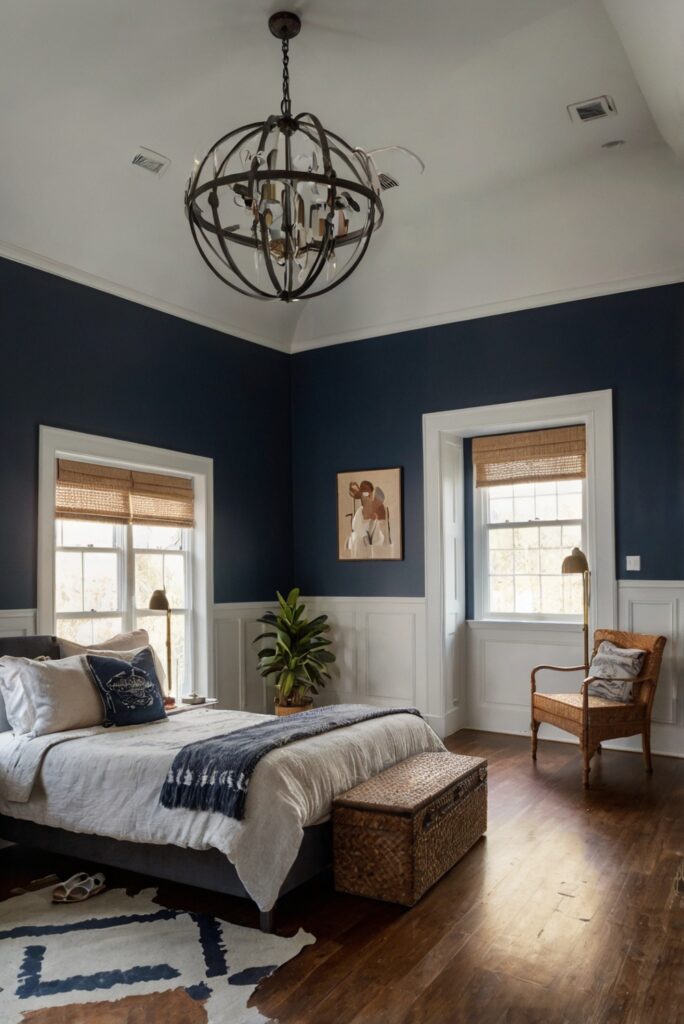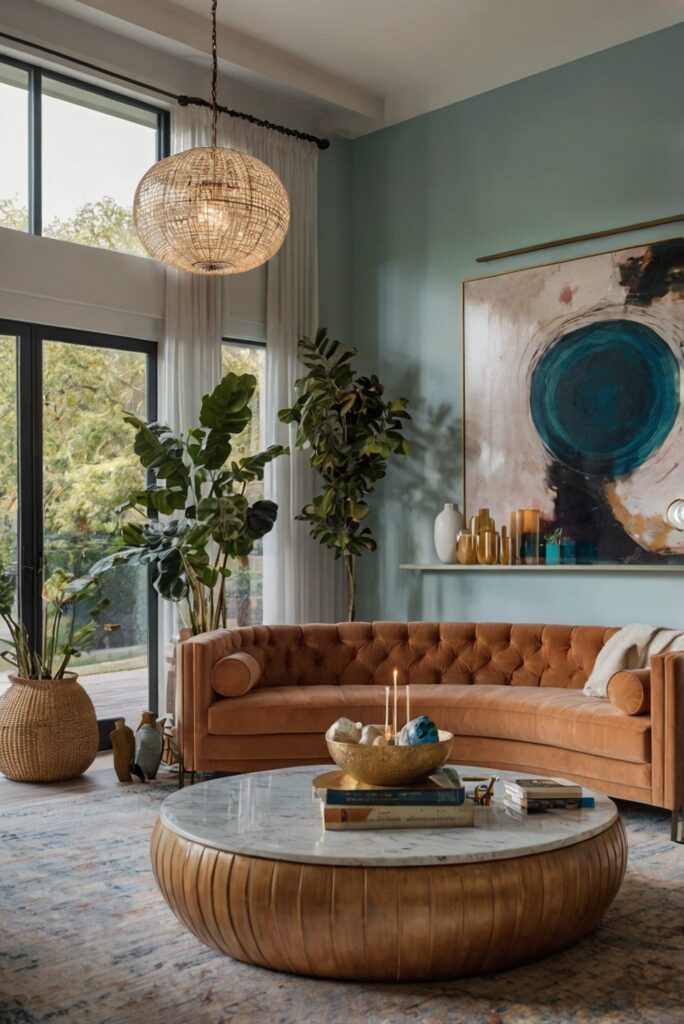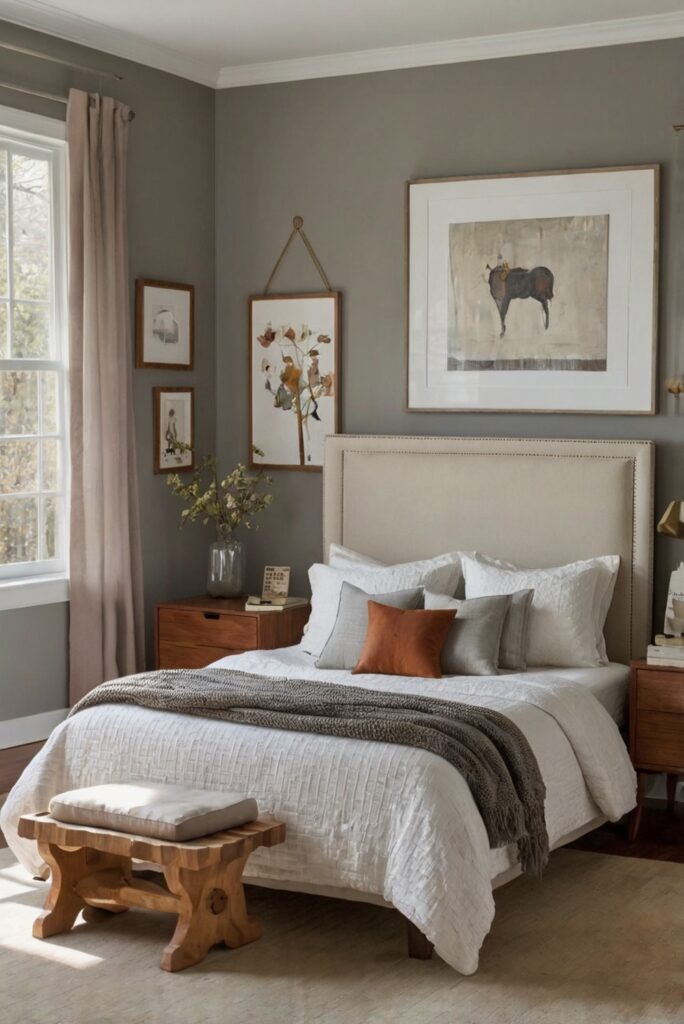Discover expert tips on selecting paint colors for bedrooms with high ceilings. Elevate the decor of your space with the perfect color palette.
How to Select Paint Colors for Bedrooms with High Ceilings?
Choosing paint colors for bedrooms with high ceilings requires special attention to maintain balance and visual appeal in the space. Start by considering the room’s overall decor style and the mood you want to create. Lighter shades can make the room feel more spacious and airy, while darker tones add coziness. Use color samples to test different hues in the room’s lighting conditions before committing to a color. Remember to factor in the ceiling color as well, as it can impact the overall look of the room. Consider using primer to ensure proper color application and matching existing wall colors. Finally, work with a professional interior designer for expert advice on space planning and color coordination.
Consider the Room’s Size and Natural Light
When selecting paint colors for bedrooms with high ceilings, it is crucial to consider the room’s size and the amount of natural light it receives. Lighter colors can make a room feel more spacious and airy, while darker colors can create a more intimate and cozy atmosphere. If the room is large with high ceilings and plenty of natural light, you can opt for bold and dark colors to add drama and warmth without overwhelming the space.
Choose Colors that Complement the Ceiling Height
To enhance the beauty of high ceilings, choose paint colors that complement the height rather than compete with it. Soft pastel shades like light blues, greens, or lavenders can create a calming and serene environment, making the ceilings appear higher. You can also consider using a monochromatic color scheme with different shades of the same color to add depth and dimension to the room without overwhelming the space.
Highlight Architectural Features
When selecting paint colors for bedrooms with high ceilings, consider highlighting the room’s architectural features. Use contrasting colors to draw attention to moldings, trim, or other details that add character to the space. Painting these features in a different color than the walls can create visual interest and enhance the overall design of the room.
Utilize Accent Walls
In bedrooms with high ceilings, accent walls can be a great way to add a pop of color and create a focal point in the room. Choose a wall that is not too tall or too short to maintain balance in the space. You can use bold and vibrant colors on the accent wall to create a striking contrast with the rest of the room or opt for a more subtle shade that complements the overall color scheme.
Test Paint Samples
Before committing to a paint color for your bedroom with high ceilings, it is essential to test paint samples on the walls. Lighting conditions can greatly affect how a color appears in a room, so it is crucial to observe how the paint looks at different times of the day. Paint small sections of the walls with different colors and observe how they interact with the natural light and the room’s decor before making a final decision.
1. How can I choose the right paint colors for a bedroom with high ceilings?
Selecting paint colors for bedrooms with high ceilings can be challenging. Consider using light, soft colors to create a cozy atmosphere and make the room feel more intimate. Cool tones like blues and greens can help visually lower the ceiling height, while warm tones like yellows and oranges can add warmth to the space. Neutral colors like white, beige, or light gray are versatile options that can complement various decor styles.
2. Should I match the wall color with the ceiling color in a bedroom with high ceilings?
It is not necessary to match the wall color with the ceiling color in a bedroom with high ceilings. In fact, painting the walls and ceiling the same color can create a seamless look and make the room feel more cohesive. However, using different colors for the walls and ceiling can add visual interest and highlight the height of the space. Consider using a lighter shade on the ceiling to keep the room feeling open and airy.
3. What are some popular paint colors for bedrooms with high ceilings?
Popular paint colors for bedrooms with high ceilings include soft blues, greens, grays, and whites. These colors can create a calming and relaxing atmosphere, perfect for a bedroom. Light shades of these colors can help balance the height of the ceilings and make the room feel more inviting. Additionally, bold accent colors like deep navy, emerald green, or charcoal gray can add drama and sophistication to the space.
4. How can I test paint colors in a bedroom with high ceilings?
When testing paint colors in a bedroom with high ceilings, consider painting large swatches on the walls and observing them at different times of the day to see how the natural light affects the colors. You can also use paint samples or peel-and-stick swatches to see how the colors look in the room before committing to a full paint job. It’s important to consider the room’s lighting, furniture, and decor when choosing a paint color to ensure it complements the space.
5. What are some tips for selecting the right paint finish for a bedroom with high ceilings?
When selecting a paint finish for a bedroom with high ceilings, consider using a matte or eggshell finish for the walls to minimize glare and create a soft, velvety look. For the ceiling, a flat or matte finish can help disguise imperfections and create a smooth, even surface. If you want to add a touch of sheen, consider using a satin or semi-gloss finish for trim and accents to create contrast and visual interest. Remember to consider the amount of natural light in the room when choosing a paint finish to achieve the desired effect.



